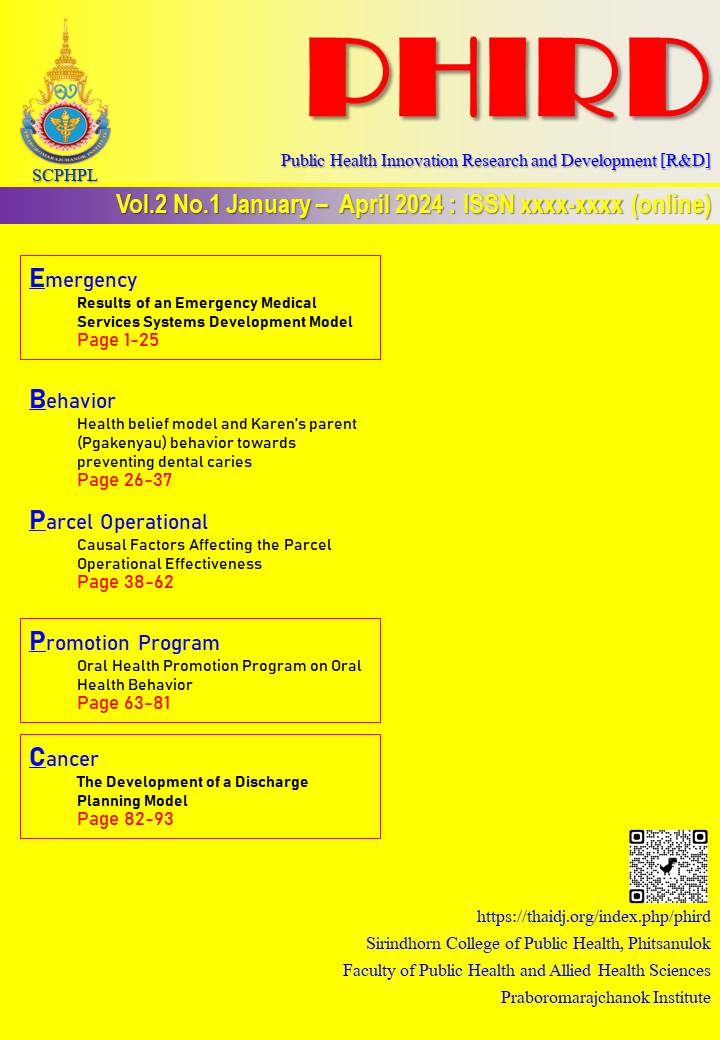The Effectiveness of an Oral Health Promotion Program on Oral Health Behavior among 12-Year-old Students
Keywords:
oral health promotion program, behavioral performance of oral health care, plaque, 12 year-old studentsAbstract
Background: Dental caries and oral health problems dental problems are still at every level up to the world level. The relevant personnel tried to solve problems in many ways but only partially.
Aim: The research aimed to evaluate the effectiveness of an oral health promotion program on oral health behavior among 12-year-old students. The research methodology was conducted into three steps of research and development: (1) create and justification of program; and (2) implementation and dissemination of results. (3) study satisfaction towards using the developed model.
Methods: This is quasi-experimental. Two schools in Watbot District, Phitsanulok Province with similar features were selected by purposive sampling as the study groups (choose 30 students aged 12 who are studying in Elementary School, Grade 5-6). The experimental group received an oral health promotion program on oral health behavior. The controlled group received routine oral health instruction. Data were collected twice at the beginning and the end of the program using tests, questionnaires, and plaque records and analyzed with percentage, mean score, standard deviation, independent t-test, and paired sample t-test.
Results: 1) the program consisted of 5 components: principles, objectives, contents, competency development procedures, assessment and evaluation and the quality of the model assessed by experts was good 2) the results revealed that after receiving the program, the experimental group had significantly higher mean scores for oral health care knowledge, oral health care attitude, and behavioral performance of oral health care and significantly lower plaque score than before receiving the program and control group at the 0.05 level. 3) The level of satisfaction towards the program was at a high level.
Conclusions: The findings of this research have shown that an oral health promotion program could improve the mean score of oral health care knowledge, oral health care attitude, and behavioral performance of oral health care. It could also reduce plaque scores among 12-year-old students.
References
Bandura A. (1997). Self-efficacy: Toward a unifying theory of behavioral change. PSYCHOL REV, 84(2): 191-215.
Buathong C, Promsiripaiboon Y, Vatchalavivat A. (2015). The Effects of Oral Health Promotion Program on Dental Caries Prevention behaviors of Grade Six Students at Ban Banghean School at Plaipraya District, Krabi Province. J Commun Health Develop KKU, 3(2): 293-306.
Dental Health Division. (2012). The 7th Thailand national oral health survey report. Nontaburi: Department of Health, Ministry of Public Health. 68-9.
Division of Dental Health, Department of Health, Ministry of Public Health. (2012). The 7th National Oral Health Survey Report. Bangkok: Samcharoen Panich.
Greene JC, Vermillion JR. (1964). The Simplified Oral Hygiene Index. JADA, 68: 7-13.
Iamsupasit S. (2006). Theories and techniques in behavior modification. 5th ed. Bangkok: Chulalongkorn University.
Inpun W. (2015). Effect of Dental Health Program to Dental Caries Prevention Behavior among Sixth Grade Students of Anubanprachinburi School. PRRJ, 10(1): 131-142.
Phongpisanu B. (2018). Main Steps of Doing Research and Development in Public Health. Med J Clin Trials Case Stud, 2(10): 000183. DOI: 10.23880/mjccs-16000183
Phongpisanu B. (2019). Techniques for Writing Chapter I of Research and Development in Public Health. Med J Clin Trials Case Stud, 3(4): 000222. DOI: 10.23880/mjccs-16000222
Phongpisanu B. (2020) Process of Research and Development in Public Health. Int J Clin Case Stud Rep, 2(1): 61-65.
Rosphirom S. (2013). The Effectiveness of a Dental Health Education Programme Appying Self- Efficacy Theory on Dental Health Behavior of Prathomsuksa 4 Students in Muang District, Nakronpathom Province. Thesis of Master of Science Degree in Health Education, Graduate School, Srinakharinwirot University.
Tansakul S. (2005). Theories and Models Applied to Health Education and Behavioral Science. 2nd ed. Bangkok: Yutharint Printing.
Phongpisanu, B.. (2021). Main Steps of Doing Research and Development in Public Health: An Observational Study. New Frontiers in Medicine and Medical Research Vol. 14, 80–86. https://doi.org/10.9734/bpi/nfmmr/v14/4289F, https://www.bookpi.org/bookstore/product/new-frontiers-in-medicine-and-medical-research-vol-14/
Phongpisanu, B.. (2021). Techniques of Writing Chapter 1 for Research and Development in Public Health. New Frontiers in Medicine and Medical Research Vol. 14, 65–79. https://doi.org/10.9734/bpi/nfmmr/v14/3839F, https://www.bookpi.org/bookstore/product/new-frontiers-in-medicine-and-medical-research-vol-14/
Phongpisanu B. (2020). A Technique of Modeling in Public Health Research and Development. World Journal of Public Health, 5(4), 2020, pp. 89-98. doi: 10.11648/j.wjph.20200504.13
Phongpisanu B. (2019). Techniques for Writing Chapter I of Research and Development in Public Health. Med J Clin Trials Case Stud, 3(4): 000222. DOI: 10.23880/mjccs-16000222
Downloads
Published
How to Cite
Issue
Section
License
Copyright (c) 2022 Public Health Innovation Research and Development - การวิจัยและพัฒนานวัตกรรมสาธารณสุข

This work is licensed under a Creative Commons Attribution-NonCommercial-NoDerivatives 4.0 International License.
This journal is published under the terms of the Creative Commons Attribution 4.0 International (CC-BY-NC-ND 4.0) by Sirindhorn College of Public Health Phitsanulok, Faculty of Public Health and Allied Health Sciences, Praboromarajchanok Institute, Ministry of Public Health, Thailand





